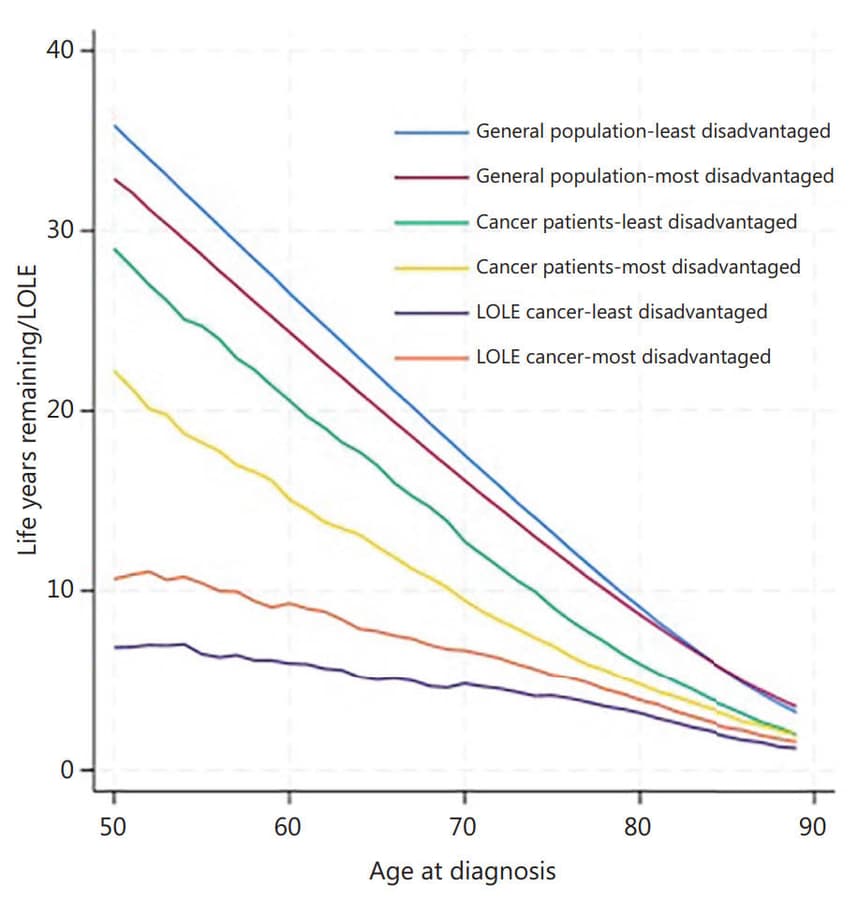Study Reveals Stark Socioeconomic Disparities in Cancer Patient Life Expectancy
December 24th, 2024 8:00 AM
By: Newsworthy Staff
New research from Australia shows significant differences in life expectancy for cancer patients based on socioeconomic status, highlighting urgent need for equitable cancer care and policy interventions.

A groundbreaking study conducted in New South Wales, Australia, has uncovered alarming disparities in life expectancy among cancer patients based on their socioeconomic status. The research, published in Cancer Biology & Medicine, analyzed data from over 422,000 cancer patients aged 50 to 89 diagnosed between 2001 and 2019, revealing that individuals from disadvantaged areas face a substantially greater reduction in life expectancy following a cancer diagnosis compared to those from more affluent backgrounds.
The study, led by researchers from The Daffodil Centre (a joint venture between the University of Sydney and Cancer Council NSW) in collaboration with Cancer Council Queensland, provides compelling evidence of the profound impact socioeconomic factors have on cancer outcomes. The findings underscore the urgent need for targeted interventions and policy changes to address these inequalities and ensure more equitable survival outcomes for all cancer patients, regardless of their economic status or place of residence.
Particularly concerning is the observation that the socioeconomic disparity was most pronounced among patients diagnosed with cancers that typically have higher survival rates, such as prostate and breast cancer. Furthermore, the gap was most evident in patients diagnosed at earlier cancer stages, highlighting the critical importance of improving access to early detection, quality treatment, and comprehensive survivorship care across all socioeconomic levels.
Dr. Xue Qin Yu, the study's principal investigator, emphasized the broader implications of these findings, stating, "Our findings clearly show that the battle against cancer is not just a matter of medical treatment; it's also about overcoming the challenges posed by socioeconomic inequalities." This research serves as a call to action for healthcare policymakers to prioritize equity in their cancer care strategies and allocate resources to underserved communities.
The implications of this study extend far beyond the borders of Australia, resonating with global concerns about healthcare disparities. To address the life expectancy gap, healthcare systems worldwide must focus on improving early detection mechanisms and ensuring equitable access to treatment, particularly in underserved areas. This may involve redirecting resources to communities most affected by these disparities and equipping healthcare providers with the tools and knowledge necessary to deliver care tailored to the socioeconomic realities of their patients.
Moreover, the research highlights the need for a multifaceted approach to cancer care that goes beyond medical treatment alone. Addressing socioeconomic inequalities in cancer outcomes will require collaboration between healthcare providers, policymakers, and community organizations to develop comprehensive support systems for all cancer patients. This includes improving access to education about cancer prevention and early detection, reducing financial barriers to healthcare, and providing support services to help patients navigate the complexities of cancer treatment and survivorship.
As the global community continues to make strides in cancer research and treatment, this study serves as a stark reminder that progress must be inclusive. The ultimate goal is not only to extend lives but to ensure that all individuals, regardless of their economic status, have the opportunity to lead healthier lives post-diagnosis. By addressing these socioeconomic disparities, we can work towards a future where a cancer diagnosis does not disproportionately impact life expectancy based on one's socioeconomic background.
This research calls for immediate action from healthcare systems, policymakers, and society at large to bridge the gap in cancer care and outcomes. Only through concerted efforts to address these inequalities can we hope to create a more equitable healthcare landscape where all cancer patients have the best possible chance at survival and quality of life.
Source Statement
This news article relied primarily on a press release disributed by 24-7 Press Release. You can read the source press release here,
